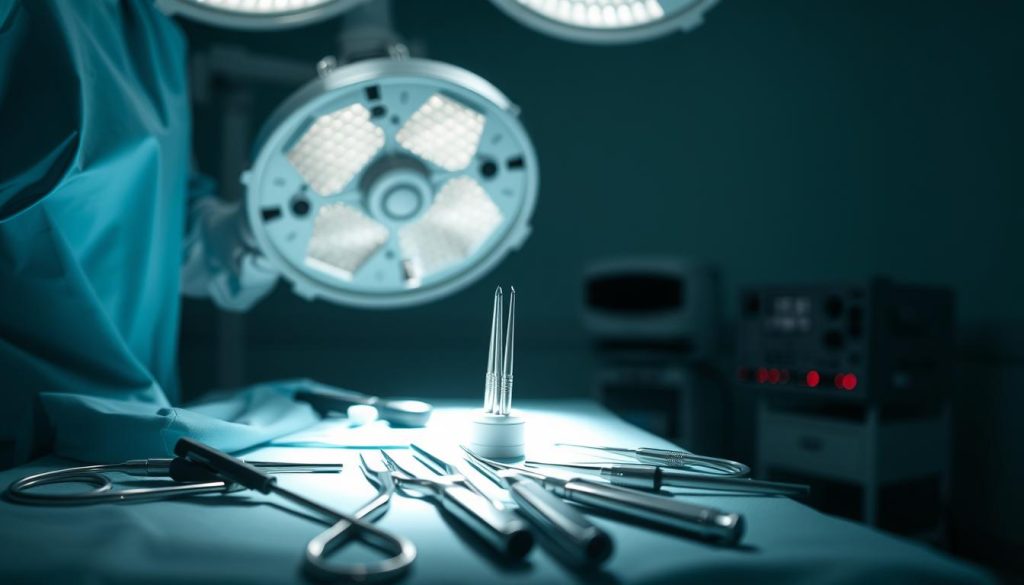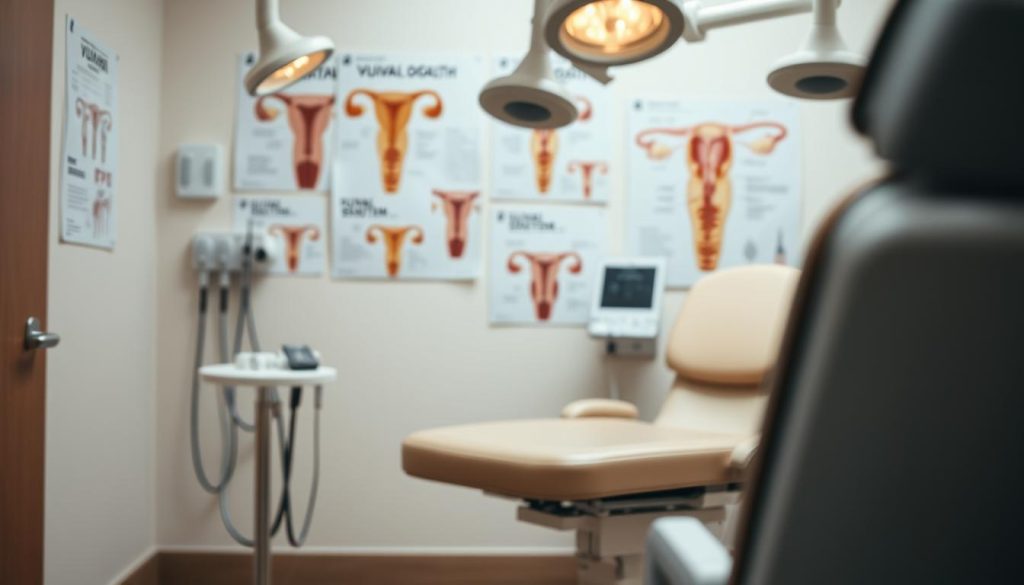Vulvar cancer is a rare but serious condition that affects the outside of the female genitalia. This guide covers the signs, symptoms, and treatment options for vulvar cancer. It’s important for both patients and healthcare providers to know this information.
Spotting vulvar lesions early is key for a quick diagnosis and effective treatment. Gynecologic oncology specialists are essential in managing this complex condition. They create personalized care plans for each patient.
We’ll cover everything from the first symptoms to advanced treatment options. Whether you’re looking for info for yourself or a loved one, this guide aims to help. It’s here to give you the knowledge and support you need on this journey.
What is Vulvar Cancer: Definition and Overview
Vulvar cancer is a rare cancer that affects the outside of the female genital area. It often starts on the outer parts of the vulva, like the labia, clitoris, and vaginal opening. This disease can happen at any age but is more common in older women.
Types of Vulvar Cancer
The most common type of vulvar cancer is squamous cell carcinoma, making up about 90% of cases. Other types include:
- Vulvar melanoma
- Adenocarcinoma
- Basal cell carcinoma
- Sarcoma
Vulvar melanoma is rare but very aggressive. It comes from pigment-producing cells in the vulvar skin.
Anatomical Location and Tissue Involvement
Vulvar cancer can affect different parts of the vulva:
- Labia majora (outer lips)
- Labia minora (inner lips)
- Clitoris
- Perineum (area between vagina and anus)
If not treated, the disease can spread to nearby tissues and lymph nodes.
Global Prevalence and Statistics
Vulvar cancer is not very common, making up about 4% of gynecologic cancers worldwide. In the United States, around 6,000 new cases are found each year. Early detection is key, with a 71% 5-year survival rate.
Risk Factors and Causes of Vulvar Cancer
Knowing the risk factors for vulvar cancer is key to prevention and early detection. Some risks we can’t control, but others we can manage through lifestyle changes.
Age-Related Risk Factors
Vulvar cancer risk goes up with age. Women over 70 are at higher risk. Regular check-ups are important as we get older to catch signs early.
HPV Infection and Cancer Development
HPV-related vulvar cancer is a big concern. The human papillomavirus (HPV) is linked to many cases. Vaccination against HPV can lower risk, best when given young.
| HPV Type | Risk Level | Prevention Method |
|---|---|---|
| HPV 16 | High | Vaccination |
| HPV 18 | High | Vaccination |
| HPV 31 | Moderate | Regular screening |
Lifestyle and Environmental Factors
Certain lifestyle choices can affect vulvar cancer risk. Smoking, for example, raises the risk. Staying healthy and avoiding tobacco can lower risk.

By understanding these risk factors, we can take steps to lower our chances of vulvar cancer. Regular screenings and a healthy lifestyle are key to prevention.
Early Warning Signs and Symptoms
It’s key to spot early signs of vulvar cancer for quick treatment. Women should watch for changes in their vulvar area. If you see anything odd, get medical help right away.
Vulvar lesions are a common sign of cancer. They might look like bumps, sores, or color changes on the vulva. Not all are cancer, but any that don’t change or go away need a doctor’s check.
Other symptoms to watch for include:
- Persistent itching or burning sensation in the vulvar area
- Pain or tenderness during urination or sexual intercourse
- Unusual bleeding or discharge not related to menstruation
- Thickening of the skin on the vulva
- Changes in the color or texture of vulvar skin
These symptoms can also mean other issues, like infections or skin problems. Regular self-checks and doctor visits can catch problems early. If you have these symptoms for over two weeks, see your doctor fast.
Early finding of vulvar cancer leads to better treatment results. Talk openly with your doctor about vulvar health worries.
Vulvar Intraepithelial Neoplasia (VIN): Precancerous Changes
Vulvar intraepithelial neoplasia is a condition that can lead to cancer. It affects the skin of the vulva. Knowing about VIN is key to catching it early and stopping vulvar cancer.
Different Grades of VIN
VIN is divided into three levels based on how bad the cell changes are:
- VIN 1: Mild changes, affecting the lower third of the epithelium
- VIN 2: Moderate changes, affecting up to two-thirds of the epithelium
- VIN 3: Severe changes, affecting more than two-thirds of the epithelium
Management of Precancerous Lesions
How to treat VIN depends on the grade and size of the lesion. Treatment options include:
- Topical medications
- Laser therapy
- Cryotherapy
- Surgical excision
Prevention Strategies
To prevent VIN, focus on reducing risk factors:
- HPV vaccination
- Regular gynecological check-ups
- Practicing safe sex
- Quitting smoking
| VIN Grade | Risk of Progression | Recommended Follow-up |
|---|---|---|
| VIN 1 | Low | Annual check-ups |
| VIN 2 | Moderate | Biannual check-ups |
| VIN 3 | High | Quarterly check-ups |
Diagnostic Methods and Procedures
Early detection is key in vulvar cancer. Gynecologic oncology specialists use many methods to find and confirm this condition. They start with a detailed physical exam and review of your medical history.
A major tool is the vulvar biopsy. This involves taking a small tissue sample for close examination. It helps find out if cancer is there and what type it is.
Imaging tests are also important. They include:
- CT scans
- MRI scans
- PET scans
These tests let doctors see how far the cancer has spread. They check if it has reached nearby lymph nodes or other organs.
At times, a colposcopy is done. This uses a special device to look closely at the vulva, vagina, and cervix. It spots abnormal areas that need more testing.
Blood tests and urine analysis are also used. They check your overall health and rule out other conditions. With the help of gynecologic oncology specialists, these tests ensure a thorough diagnosis of vulvar cancer.
Understanding Vulvar Dysplasia and Its Progression
Vulvar dysplasia is a condition where abnormal cells grow on the vulva. It’s important to understand this condition because it can turn into vulvar cancer if not treated. Early detection and proper management are key to preventing serious health issues.
Stages of Dysplasia
Vulvar dysplasia is classified into different stages based on the severity of cell changes:
- Mild dysplasia: Abnormal cells are found in the lower third of the epithelium
- Moderate dysplasia: Abnormal cells extend to the middle third of the epithelium
- Severe dysplasia: Abnormal cells are present throughout the epithelium
Treatment Options for Different Stages
Treatment for vulvar dysplasia varies depending on the stage and extent of the condition:
| Stage | Treatment Options |
|---|---|
| Mild dysplasia | Watchful waiting, topical medications |
| Moderate dysplasia | Laser therapy, cryotherapy, surgical excision |
| Severe dysplasia | Wide local excision, vulvectomy |
Regular follow-ups are key for all stages of vulvar dysplasia. Your doctor will closely monitor the condition and adjust treatment as needed. This helps prevent the condition from turning into cancer. Remember, early intervention is vital in managing vulvar dysplasia effectively.
Treatment Options and Medical Interventions
Vulvar cancer treatment includes various medical steps. Doctors pick the best option based on the cancer’s stage, location, and your health. Let’s look at the main treatment choices.
Surgical Approaches
Surgery is often the first step in treating vulvar cancer. It aims to remove the tumor and nearby tissue. Sometimes, a radical vulvectomy is needed, which removes the entire vulva and lymph nodes.
Radiation Therapy
Radiation therapy uses high-energy beams to kill cancer cells. It can be used before surgery to shrink tumors or after to kill any remaining cells. Some patients get radiation as their main treatment if surgery isn’t an option.
Chemotherapy Protocols
Chemotherapy uses drugs to destroy cancer cells in the body. It’s often used with radiation for advanced vulvar cancers. Chemo can help shrink tumors before surgery or control cancer that has spread.
| Treatment | Primary Use | Possible Side Effects |
|---|---|---|
| Surgery | Tumor removal | Pain, infection risk |
| Radiation | Kill cancer cells | Skin irritation, fatigue |
| Chemotherapy | Systemic treatment | Nausea, hair loss |
Your doctor will create a treatment plan just for you. This plan might include one or more of these therapies. It’s designed to give you the best chance of recovery.
Radical Vulvectomy: When Is It Necessary?
Radical vulvectomy is a surgery for advanced vulvar cancer. It removes the vulva, labia, clitoris, and sometimes lymph nodes. It’s considered when other treatments don’t work.
- Cancer has deeply invaded surrounding tissues
- Tumors are large or multiple
- Previous treatments were unsuccessful
- There’s a high risk of cancer recurrence
Choosing radical vulvectomy is a big decision. It’s a major surgery with big physical and emotional effects. Proper care and support are key for recovery and adjustment.
| Aspect | Details |
|---|---|
| Surgery Duration | 2-4 hours |
| Hospital Stay | 5-7 days |
| Recovery Time | 6-8 weeks |
| Possible Side Effects | Pain, swelling, lymphedema, sexual difficulties |
Radical vulvectomy is a tough treatment but offers hope for advanced vulvar cancer. Modern surgery tries to save as much healthy tissue as it can. This helps improve life after surgery.
Modern Approaches in Gynecologic Oncology
Gynecologic oncology has made big strides in recent years. These new methods bring hope to those with vulvar cancer and other gynecological cancers. Let’s dive into the latest treatments and therapies changing the field.
Latest Treatment Protocols
Personalized medicine is becoming more common in gynecologic oncology. Doctors now create treatments based on a patient’s genes and cancer type. This makes treatments more effective and reduces side effects.
- Targeted therapies that attack cancer cells while sparing healthy tissue
- Combination treatments that pair surgery with newer drug regimens
- Minimally invasive surgical techniques for faster recovery
Emerging Therapies
New therapies are emerging in gynecologic oncology. These promising methods aim to treat even advanced vulvar cancer.
- Immunotherapy: Boosts the body’s natural defenses to fight cancer
- PARP inhibitors: Block cancer cells from repairing their DNA
- Nanoparticle drug delivery: Targets medication directly to tumor sites
As research in gynecologic oncology continues, patients have more hope. They can look forward to treatments that are more effective and less invasive. These advancements are bringing us closer to better outcomes and a better quality of life for those with vulvar cancer.
Vulvar Reconstruction and Recovery
Many women face the challenge of vulvar reconstruction after cancer treatment. This process aims to restore function and appearance. It plays a key role in both physical and emotional recovery.

Vulvar reconstruction techniques vary based on tissue removal. For smaller areas, surgeons use skin grafts or local flaps. Larger defects might need more complex procedures, like muscle flaps from the thigh or abdomen.
Recovery from vulvar reconstruction involves careful wound care and gradual activity resumption. Patients usually stay in the hospital for several days after surgery. Pain management and preventing infection are top priorities during this time.
Physical therapy is often key in recovery. Exercises to strengthen pelvic floor muscles can improve bladder control and sexual function. Working with a therapist specializing in post-cancer rehabilitation can enhance recovery.
Emotional healing is also vital. Support groups and counseling offer valuable resources for body image concerns and adjusting to life after cancer treatment. Open communication with healthcare providers about any challenges is essential for care.
While vulvar reconstruction can improve quality of life, it’s important to have realistic expectations. Full recovery may take several months. Some women may experience lasting changes in sensation or function. Regular follow-up appointments help monitor progress and address concerns during the healing journey.
Immunotherapy Advances in Vulvar Cancer Treatment
Immunotherapy for vulvar cancer is a new and hopeful treatment. It uses the body’s immune system to fight cancer. Researchers are finding new ways to help patients with this tough disease.
Types of Immunotherapy
There are several types of immunotherapy for vulvar cancer:
- Checkpoint inhibitors: These drugs block proteins that prevent immune cells from attacking cancer cells
- Cancer vaccines: Designed to stimulate the immune system to recognize and destroy cancer cells
- Adoptive cell therapy: Involves removing immune cells, modifying them in a lab, and reinfusing them into the patient
Each type works in its own way to help the body fight cancer. Scientists are studying them to see how well they work for vulvar cancer.
Success Rates and Outcomes
Immunotherapy for vulvar cancer is showing early promise. Early trials have seen good results, mainly for those with advanced or recurring disease. Some highlights include:
- Improved response rates compared to traditional chemotherapy
- Extended progression-free survival in some patients
- Potential for long-lasting remissions in a subset of individuals
Doctors are working to make these treatments even better. They want to find out who will benefit most and how to use them with other treatments. This could bring new hope to patients with vulvar cancer.
Living with Vulvar Cancer: Coping Strategies
Living with vulvar cancer can be tough, but there are ways to cope. You can keep a good quality of life. Patients often face emotional and practical challenges during and after treatment. By using effective strategies, you can face this journey better.

Building a strong support network is key. Talk to family, friends, or support groups for vulvar cancer. Sharing your story can help you feel better and get advice from those who get it.
Self-care is vital when dealing with vulvar cancer. This means:
- Eating a balanced diet
- Doing gentle exercise as your doctor suggests
- Getting enough rest
- Trying stress-reduction methods like meditation or yoga
Talking openly with your healthcare team is important. They can help with symptoms and improve your comfort. Don’t be shy about asking for pain relief or counseling if you’re feeling down.
Also, find activities that make you happy. Whether it’s a hobby, time in nature, or being with loved ones, these moments are precious. They help you stay positive while living with vulvar cancer.
Post-Treatment Care and Follow-up
After treatment for vulvar cancer, ongoing care is key. Experts in gynecologic oncology stress the need for regular check-ups. These visits help track recovery and catch any early signs of recurrence.
Monitoring Schedule
A typical follow-up schedule for vulvar cancer survivors includes:
- Every 3-6 months for the first two years
- Every 6-12 months for years 3-5
- Annually after five years
Visits may include physical exams, imaging tests, and blood work. Your gynecologic oncology team decides what tests you need. This careful monitoring helps spot any problems early.
Long-term Health Considerations
Survivors of vulvar cancer should be aware of long-term effects:
| Consideration | Impact | Management |
|---|---|---|
| Lymphedema | Swelling in legs or groin | Physical therapy, compression garments |
| Sexual function | Changes in sensation or discomfort | Counseling, lubricants, pelvic floor therapy |
| Emotional health | Anxiety, depression | Support groups, psychotherapy |
| Secondary cancers | Increased risk | Regular screenings, healthy lifestyle |
Talking openly with your gynecologic oncology team is important. They can help manage symptoms and improve your quality of life after treatment.
Every survivor’s journey is different. Your care plan will be made just for you. Stay active in your health and always ask your healthcare providers questions or concerns.
Prevention and Risk Reduction Strategies
Preventing vulvar cancer is key to good gynecological health. While some cases can’t be prevented, there are steps to lower your risk. These steps are very important for HPV-related vulvar cancer.
HPV vaccination is a major way to prevent HPV-related vulvar cancer. It works best when given before you’re exposed to the virus. This is why it’s recommended for preteens and young adults. Also, regular check-ups and Pap smears help find problems early.
Changing your lifestyle can also help. Quitting smoking, staying at a healthy weight, and safe sex practices can reduce your risk. Eating lots of fruits and veggies boosts your immune system. This helps your body fight off HPV infections.
- Get HPV vaccination
- Schedule regular gynecological exams
- Quit smoking
- Maintain a healthy weight
- Practice safe sex
- Eat a balanced diet
Knowing your family history is also important. If a close relative had vulvar or other gynecological cancers, talk to your doctor. They might suggest more frequent tests or other preventive steps.
By following these steps, you can protect your health and lower your risk of HPV-related vulvar cancer. Remember, regular check-ups are vital for catching problems early and treating them well.
Support Resources and Patient Education
Facing vulvar cancer can feel overwhelming, but you’re not alone. Many support resources and educational materials are here to help. The Foundation for Women’s Cancer provides detailed information on vulvar cancer, from diagnosis to treatment.
Support groups are key in the healing journey. They offer a safe place to share experiences, fears, and victories with others who get it. Hospitals and cancer centers often host meetings, both in-person and online, for those dealing with vulvar cancer.
Educational programs give patients the knowledge they need. They cover symptom management, treatment side effects, and emotional health. Some groups offer webinars and workshops led by experts, providing direct advice.
Financial help is also available to reduce medical costs. Patient advocates can help with insurance and connect you to resources for travel, lodging, and more. Remember, asking for help is a sign of strength in your battle against vulvar cancer.
FAQ
Q: What is vulvar cancer?
A: Vulvar cancer is a type of cancer that affects the outside of the female genital area. It can happen in different parts, like the labia and clitoris. The most common type is squamous cell carcinoma.
Q: What are the early warning signs of vulvar cancer?
A: Signs of vulvar cancer include itching, burning, or pain. You might also notice changes in skin color or texture. Look out for unusual growths, bleeding, or sores that don’t heal.
Q: How is vulvar cancer diagnosed?
A: Doctors use a physical exam, biopsy, and imaging to diagnose vulvar cancer. A gynecologic oncologist will check you, take a tissue sample, and might order CT scans or MRIs.
Q: What is Vulvar Intraepithelial Neoplasia (VIN)?
A: VIN is a precancerous condition of the vulvar skin. It’s graded based on cell growth. While not cancer, VIN can turn into vulvar cancer if not treated early.
Q: What are the treatment options for vulvar cancer?
A: Treatment for vulvar cancer varies by stage. It might include surgery, radiation, chemotherapy, or a mix. Immunotherapy is sometimes used for advanced cases.
Q: Is HPV related to vulvar cancer?
A: Yes, HPV is linked to many vulvar cancers, mainly in younger women. HPV-related cancers start from VIN. But, not all vulvar cancers are caused by HPV.
Q: What is vulvar dysplasia?
A: Vulvar dysplasia is abnormal cell changes in the vulvar skin. It’s a precancerous condition that can be mild or severe. It can turn into cancer if not treated, but not all cases will.
Q: What is involved in vulvar reconstruction after cancer treatment?
A: After surgery for vulvar cancer, reconstruction may be needed. It aims to restore the vulva’s look and function. Techniques vary from simple grafts to complex flap procedures.
Q: How often should follow-up visits occur after vulvar cancer treatment?
A: Follow-up visits vary by case. You might see your doctor every 3-6 months for the first two years. Then, every 6-12 months for three years. Your doctor will decide the best schedule for you.
Q: Can vulvar cancer be prevented?
A: While not all vulvar cancers can be prevented, some steps can lower risk. These include getting the HPV vaccine, practicing safe sex, quitting smoking, and regular gynecological check-ups. Treating precancerous conditions like VIN early can also help prevent cancer.


















